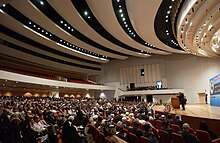Council of Representatives of Iraq
|
Council of Representatives of Iraq مجلس النواب العراقي / ئهنجومهنی نوێنهرانی عێراق Majlis an-Nuwwāb al-ʿIrāqiyy |
|
|---|---|
| Type | |
| Type | |
| Leadership | |
| Structure | |
| Seats | 328 |
 |
|
|
Political groups
|
Government coalition (262+)
|
| Elections | |
| Party-list proportional representation | |
|
Last election
|
30 April 2014 |
|
Next election
|
April 2018 |
| Meeting place | |
 |
|
| Green Zone, Baghdad | |
| Website | |
| www |
|
Government coalition (262+)
The Council of Representatives of Iraq (Arabic: مجلس النواب العراقي Majlis an-Nuwwāb al-ʿIrāqiyy، Kurdish: ئهنجومهنی نوێنهرانی عێراق، Encumena Nûnerên Êraq) is the unicameral legislature of Iraq. It is currently composed of 328 seats and meets in Baghdad inside the Green Zone.
An elected Iraqi parliament first formed following the establishment of a constitutional monarchy in 1925. The 1925 constitution called for a bicameral parliament whose lower house, the Chamber of Deputies (Majlis an-Nuwwab) would be elected based on universal manhood suffrage. The upper house, the Senate (Majlis al-A`yan) was appointed by the king. Ten elections took place between 1925 and the coup of 1958.
On January 17, 1953 elections for the Chamber of Deputies (also known as the National Assembly) took place. Following controversy over the implementation of the so-called Baghdad Pact, Prime Minister Nuri Pasha as-Said called elections the following year, in early 1954. As-Said dissolved the assembly shortly thereafter and began to rule by decree, but opposition forced him to hold a third election within three years. The second 1954 election was very corrupt, with as-Said's political enemies banned from running, and widespread voter coercion. The assembly was suspended yet again, and in 1958 a military coup deposed as-Said and the monarchy, and abolished the parliament.
The 1970 constitution created a republic with an elected National Assembly (al-Majlis al-Watani). However, elections for the Assembly did not take place until June 1980, under Iraq's new military president, Saddam Hussein. Several more elections took place between 1989 and 2003. The new Assembly was largely a figurehead that would occasionally rubber stamp the president's decrees. Elections for its members were not considered free and fair by the international community. Only members of Hussein's own Baath Party were ever elected.
...
Wikipedia
